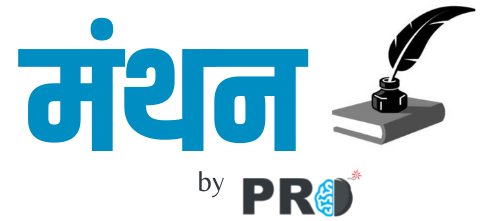-Yugantar Lokhande

Urban voters in the Lok Sabha elections of 2024 are likely to have multifaceted concerns and aspirations that reflect the complexities of urban living. Here's a detailed breakdown:
Infrastructure Development: Urban voters often prioritize candidates who promise improved infrastructure, including better roads, public transportation systems, water supply, and waste management. They aspire for modern, efficient, and well-maintained urban infrastructure that can support the growing population and economic activities in cities.
Urban planning
in Mumbai, if at all it exists,
has been marred
by inadequate speed
of regulatory changes, and
failed to keep up with societal and economic compulsions of the city. Despite
being a global economic hub, and India’s commercial city, the city grapples
with issues such as overcrowding, congestion, inadequate infrastructure, and
environmental degradation, largely due to the lack of effective rules and
regulations.
Employment Opportunities: Job creation is a major concern for urban voters,
particularly the youth. They
seek candidates who can provide policies and initiatives to stimulate economic
growth and create employment opportunities in diverse sectors such as
technology, manufacturing, services, and entrepreneurship.
There has always been a problem of employment in India and the main concerns of voters in India particularly pertained to vacancy and employment opportunities in the country for their livelihood, the main problem regarding employment opportunities in India is that the many graduates from top universities in India whether it is from engineering or other academic background, the skill-based jobs are limited as well as the govt is Taking limited steps to increase the no. Of vacancies in public and private sectors, it's the duty of both the govt as well as the citizens that The govt create more opportunities for youngsters for employment as well and the youngsters should also learn and develop skills that are necessary for their dream jobs.
Housing Affordability: Access to affordable housing remains a critical issue for urban voters, especially in metropolitan areas where housing prices are often inflated. They aspire for policies that promote affordable housing options, rental housing schemes, and measures to address homelessness and slum rehabilitation. As a matter of fact, India has been battling with the crisis of housing For the poor where the quality of life for the lower economic section of society is very difficult but also with the upcoming housing schemes provided by the govt, the govt should strictly focus on the workings of these schemes whether they are executed or implemented without any corruption or illicit activities. One of the main reasons for poor housing in India is overpopulation and limited space due to which the focus of urban voters is on that the upcoming govt should provide proper qualitative and hygienic housing for the backward sections of Indian society and also focus on the issue of urban poverty
Healthcare Services: Urban voters value access to quality healthcare facilities and affordable medical services. They are concerned about the state of public healthcare infrastructure, the availability of doctors and specialists, as well as the affordability of healthcare treatments and medicines. They aspire for improvements in healthcare delivery systems and increased investment in healthcare infrastructure. India’s healthcare system has been battling various issues, including the low number of institutions and less-than-adequate human resources, One of the most pressing problems in India remains a severe shortage of trained manpower in the medical stream, this includes doctors, nurses, paramedics and primary healthcare workers. The situation remains worrisome in rural areas, where almost 66 per cent of India’s population resides.
Education Quality: Aspiring for better educational opportunities for their children, urban voters are concerned about the quality of schools, availability of higher education institutions, and access to vocational training programs. They seek candidates who prioritize investments in education infrastructure, teacher training, and curriculum development to ensure quality education for all. The education system in India has undergone significant changes over the past few decades. Despite its long history of learning and knowledge, the Indian education system has faced numerous challenges, including unequal access to education, outdated curricula, and inadequate funding. For more info-
Digital Connectivity: In the digital age, access to reliable internet connectivity and digital infrastructure is crucial for urban voters. They aspire for improved broadband connectivity, expansion of digital networks, and initiatives to bridge the digital divide, especially in marginalized urban communities. Candidates who promote digital literacy and e-governance solutions are likely to appeal to urban voters. Although there are minor problems in connectivity in rural areas but gradually the govt is Taking steps to connect rural and urban areas globally through Broadband, smartphones using which with one click we can get entire information about a particular person or entity in one place, for
Environmental Sustainability: Urban voters are increasingly concerned about environmental issues such as air and water pollution, waste management, and climate change. They aspire for candidates who prioritize sustainable urban development, promote renewable energy initiatives, implement pollution control measures, and encourage green transportation options like electric vehicles and cycling infrastructure. As a matter of fact, it has become a necessity for urban voters for a sustainable environment in a society for positive growth and functioning, Sustainable Development Goals (SDGs) are a universal call to action to end poverty, protect the planet, and ensure that by 2030 all people enjoy peace and prosperity, though some of them are designed to end poverty, hunger and discrimination against women too.
Safety and Security: Ensuring the safety and security of urban residents is another key concern. Urban voters seek candidates who prioritize law enforcement, crime prevention measures, and initiatives to address issues such as street crime, women's safety, and cyber security.
There are ample resources in the public domain available which reveal that one of the main concerns of urban voters is their safety and security in society and the maintenance of communal harmony also one of the concerns of security and safety refers to women's safety and data security and privacy in the society, safety and security of women and children in the country is utmost priority for the Government. The Ministry of Women and Child Development has been administering various special laws relating to women such as the Protection of Women from Domestic Violence Act, 2005; Dowry Prohibition Act, 1961; Indecent Representation of Women (Prohibition) Act, 1986; the Sexual Harassment of Women at Workplace (Prevention, Prohibition and Redressal) Act, 2013 and the Prohibition of Child Marriage Act, 2006. Also if we have a look at more cent events, one such event can be the Pune car crash accident wherein a minor killed 2 people in Pune while being drunk and driving recklessly in a small lane in Pune, the Police arrested the accused but were released by giving a warning and was ordered writing an essay on traffic safety and conducting work with RTO Police, but due to societal pressure the accused was again arrested and took into custody which reflects how the system can be mould by the rich class in the country and how difficult it is for the people from the weaker section of society to get justice and how the power dynamics as well play a major role in our society and how it affects the lower section of our society, more information-
If we talk about the mainstream concerns of the urban voters, its crucial focus is on the infrastructure and clean and hygienic development in the society as well voters' main focus is also about free and fair elections where voters are not getting betrayed by the election conducting system by the ruling government, not committing fake promises to the citizens which can never be fulfilled, and also voters are interested in free press and free media in society.
This 2024 Lok Sabha elections have been through various events, we saw a change in power dynamics, the shift of public support from one party to another and so on, but the major takeaway from these elections is, how much people consider important issues, and are they really voting based on issues and problems that they face daily ranging from security to hygiene and infrastructure to education and So on.
Now in these elections, we have seen voters prioritize their choices and what are the important issues and problems based on which they have voted for that particular party with the hope of bringing a change in society. Also, in these elections, people have realized the value of their one vote and how much a vote can impact the political scenario of a country.
In summary, urban voters in the Lok Sabha elections of 2024 have diverse concerns and aspirations spanning infrastructure development, employment opportunities, housing affordability, healthcare services, education quality, digital connectivity, environmental sustainability, and safety/security. Candidates who address these issues effectively and offer comprehensive solutions are likely to resonate with urban voters and secure their support.



